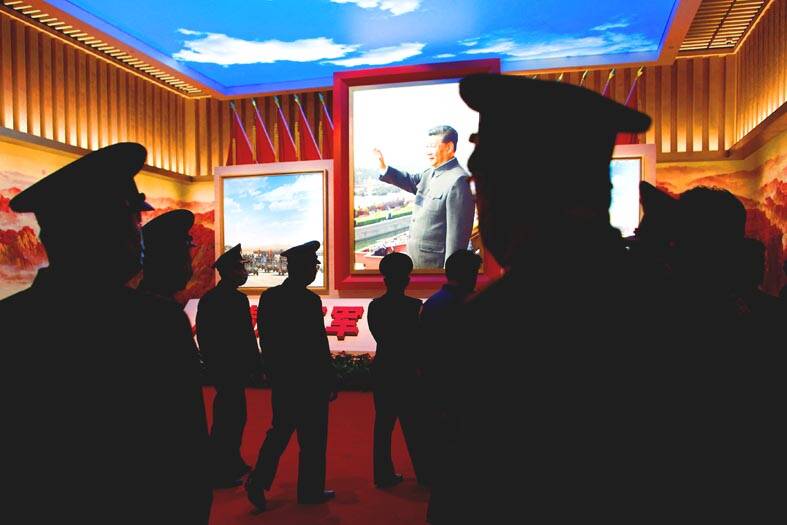Despite the lesson of the Cuban missile crisis 60 years ago, China has shown no interest in discussing steps to reduce the risk posed by nuclear weapons, senior US officials said on Tuesday, after Chinese President Xi Jinping (習近平) last month signaled that Beijing would strengthen its strategic deterrent.
The Pentagon has said China is undergoing a major expansion of its nuclear forces and is moving toward having 1,000 nuclear warheads by 2030.
However, Beijing has long resisted arms control talks with Washington, arguing that the US already has a much larger arsenal.

Photo: Reuters
Alexandra Bell, deputy assistant secretary of state for arms control, verification and compliance, told an Atlantic Council forum that despite US efforts, Washington and Beijing still had not begun engagement on the issue.
“As a first step, we’d really like to have a conversation with them about each other’s doctrines, about crisis communication, crisis management,” Bell said, adding that Washington has had such talks with Russia for decades.
“We’re not in that space with Beijing yet. So, there’s work to be done to begin the conversation, we think bilaterally,” Bell said.
“We’re now at the 60th anniversary of the Cuban missile crisis. We don’t need to repeat that to know that we need to be at the table having conversations with each other,” Bell said, referring to events in 1962 when the US and the Soviet Union came close to nuclear war over the presence of Soviet missiles in Cuba.
US National Security Adviser Jake Sullivan said last year after a call between Xi and President Joe Biden that the two had agreed to “look to begin to carry-forward discussion on strategic stability.”
However, Xi signaled during the Chinese Communist Party National Congress last month that China would strengthen its strategic deterrent, a term often used to describe nuclear weapons.

The CIA has a message for Chinese government officials worried about their place in Chinese President Xi Jinping’s (習近平) government: Come work with us. The agency released two Mandarin-language videos on social media on Thursday inviting disgruntled officials to contact the CIA. The recruitment videos posted on YouTube and X racked up more than 5 million views combined in their first day. The outreach comes as CIA Director John Ratcliffe has vowed to boost the agency’s use of intelligence from human sources and its focus on China, which has recently targeted US officials with its own espionage operations. The videos are “aimed at

STEADFAST FRIEND: The bills encourage increased Taiwan-US engagement and address China’s distortion of UN Resolution 2758 to isolate Taiwan internationally The Presidential Office yesterday thanked the US House of Representatives for unanimously passing two Taiwan-related bills highlighting its solid support for Taiwan’s democracy and global participation, and for deepening bilateral relations. One of the bills, the Taiwan Assurance Implementation Act, requires the US Department of State to periodically review its guidelines for engagement with Taiwan, and report to the US Congress on the guidelines and plans to lift self-imposed limitations on US-Taiwan engagement. The other bill is the Taiwan International Solidarity Act, which clarifies that UN Resolution 2758 does not address the issue of the representation of Taiwan or its people in

US Indo-Pacific Commander Admiral Samuel Paparo on Friday expressed concern over the rate at which China is diversifying its military exercises, the Financial Times (FT) reported on Saturday. “The rates of change on the depth and breadth of their exercises is the one non-linear effect that I’ve seen in the last year that wakes me up at night or keeps me up at night,” Paparo was quoted by FT as saying while attending the annual Sedona Forum at the McCain Institute in Arizona. Paparo also expressed concern over the speed with which China was expanding its military. While the US

SHIFT: Taiwan’s better-than-expected first-quarter GDP and signs of weakness in the US have driven global capital back to emerging markets, the central bank head said The central bank yesterday blamed market speculation for the steep rise in the local currency, and urged exporters and financial institutions to stay calm and stop panic sell-offs to avoid hurting their own profitability. The nation’s top monetary policymaker said that it would step in, if necessary, to maintain order and stability in the foreign exchange market. The remarks came as the NT dollar yesterday closed up NT$0.919 to NT$30.145 against the US dollar in Taipei trading, after rising as high as NT$29.59 in intraday trading. The local currency has surged 5.85 percent against the greenback over the past two sessions, central